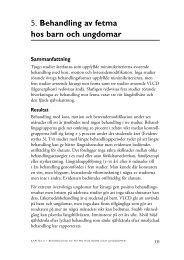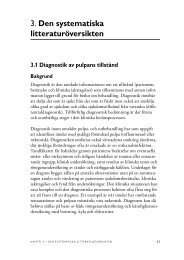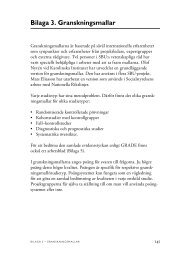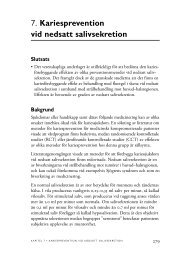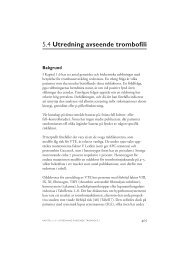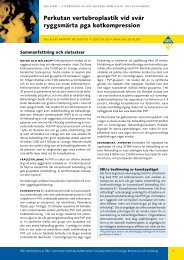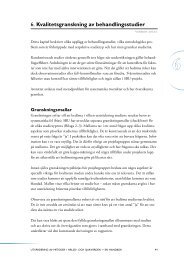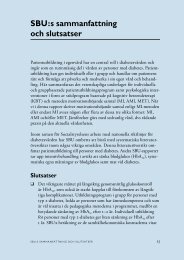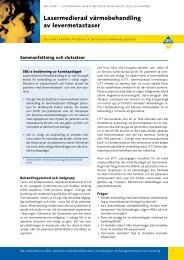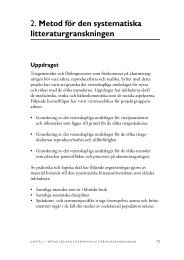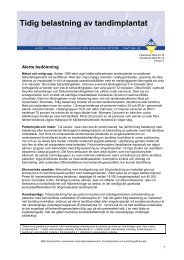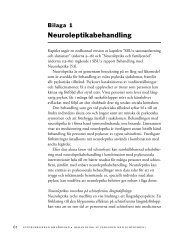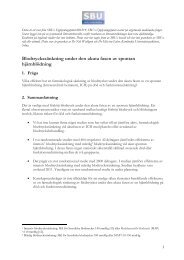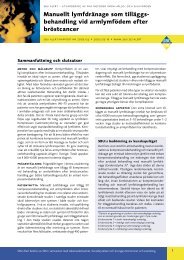Rapporten - SBU
Rapporten - SBU
Rapporten - SBU
Create successful ePaper yourself
Turn your PDF publications into a flip-book with our unique Google optimized e-Paper software.
Table 5.21 continued<br />
Author<br />
Year<br />
Reference<br />
Country<br />
Renty et al<br />
2006<br />
[6]<br />
Belgium<br />
Material<br />
Analysis method<br />
Literature review to create<br />
a special questionnaire for the<br />
purpose with six main categories<br />
supplemented with semi-structured<br />
in-depth interviews with a stratified<br />
sample of 15 parents<br />
The interviews were audio taped<br />
and transcribed verbatim. Thematic<br />
analysis<br />
Recruitment process from<br />
diagnostic centre (105/180)<br />
Advertisement (125) and special<br />
school (14)<br />
35% of the children had an<br />
intellectual disability<br />
Parents signed a consent form<br />
Informants Results Summary Study quality<br />
Comments<br />
244 parents of children with ASD,<br />
3–18 years old, male-female sex<br />
ratio 4:1)<br />
64% only mothers, 7% only<br />
fathers, 25% both parents and<br />
3% by others (grandparents)<br />
352 Autismspektrumtillstånd – diAgnostik och insAtser,<br />
KAPITEL 5 • sysTEmATIsK LITTErATurövErsIKT –<br />
353<br />
vårdens orgAnisAtion och pAtientens delAktighet<br />
Six main categories from<br />
the questionnaire<br />
• General demographic<br />
information<br />
• Diagnosis<br />
The parental satisfaction<br />
with the diagnostic<br />
process was significantly<br />
associated with the age<br />
of diagnosis, the amount<br />
and quality of perceived<br />
information<br />
• Access to appropiate<br />
education and support<br />
Dissatisfaction with<br />
long waiting lists, limited<br />
supply of specialist<br />
schools and services<br />
for ASD<br />
• Education and support<br />
Satisfactions due to<br />
mutual information<br />
exchange about the<br />
child with ASD, indivi-<br />
dual program, professional<br />
knowledge and<br />
expertise, continuity<br />
of staffing<br />
• ASD-specific knowledge<br />
and training<br />
• Concerns and future<br />
needs<br />
pAtientens delAktighet vid Ast<br />
Parents experienced difficulties<br />
with the diagnostic process, with<br />
support and education provided<br />
by mainstream settings and with<br />
the accessibility of autism-specific<br />
service provisions. Conversely,<br />
parents were satisfied with the<br />
quality of autism-specific support<br />
and education<br />
Predictors for satisfaction was<br />
parental involvement, knowledge<br />
of available services provisions, time<br />
between first consultation and final<br />
diagnosis<br />
1. Parents of children with-<br />
out intellectual disabilities generally<br />
experienced more difficulties<br />
with finding appropriate support<br />
2. Parents of older children were<br />
often concerned about the continuity<br />
of the support reaching<br />
adolescent and young adulthood<br />
3. Regardless of age, intellectual<br />
level, support needs, parents<br />
attach equal importance to close<br />
cooperation with professionals,<br />
continuity of staffing, commitment<br />
and enthusiasm of professionals,<br />
and ASD-specific knowledge<br />
Moderate<br />
Unclearness of<br />
representativeness<br />
of parents<br />
No information of<br />
ethical approval<br />
The table continues on the next page



